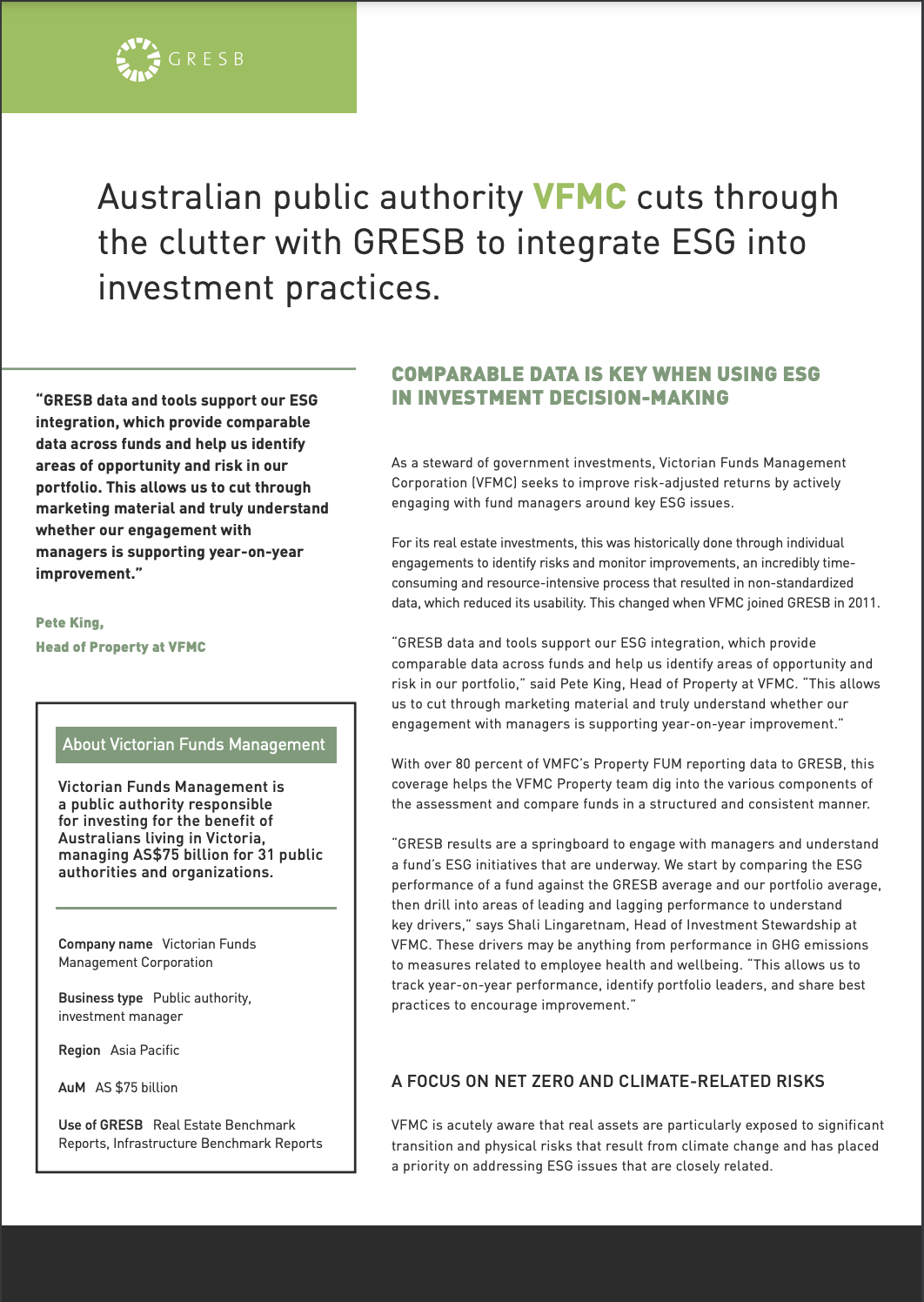Australian public authority VFMC cuts through the clutter with GRESB to integrate ESG into investment practices.

Victorian Funds Management is a public authority responsible for investing for the benefit of Australians living in Victoria, managing AUD 75 billion for 31 public authorities and organizations.
Business type: Public authority, investment manager
Region: Asia Pacific
AuM: AUD 75 billion
Use of GRESB: Real Estate Benchmark Reports, Infrastructure Benchmark Reports
Comparable data is key when using ESG in investment decision-making
As a steward of government investments, Victorian Funds Management Corporation (VFMC) seeks to improve risk-adjusted returns by actively engaging with fund managers around key ESG issues.
For its real estate investments, this was historically done through individual engagements to identify risks and monitor improvements, an incredibly time-consuming and resource-intensive process that resulted in non-standardized data, which reduced its usability. This changed when VFMC joined GRESB in 2011.
“GRESB data and tools support our ESG integration, which provides comparable data across funds and helps us identify areas of opportunity and risk in our portfolio,” said Pete King, Head of Property at VFMC. “This allows us to cut through marketing material and truly understand whether our engagement with managers is supporting year-on-year improvement.”
With over 80 percent of VMFC’s Property FUM reporting data to GRESB, this coverage helps the VFMC Property team dig into the various components of the assessment and compare funds in a structured and consistent manner.
“GRESB results are a springboard to engage with managers and understand a fund’s ESG initiatives that are underway. We start by comparing the ESG performance of a fund against the GRESB average and our portfolio average, then drill into areas of leading and lagging performance to understand key drivers,” says Shali Lingaretnam, Head of Investment Stewardship at VFMC. These drivers may be anything from performance in GHG emissions to measures related to employee health and wellbeing. “This allows us to track year-on-year performance, identify portfolio leaders, and share best practices to encourage improvement.”
A focus on net zero and climate-related risks
VFMC is acutely aware that real assets are particularly exposed to significant transition and physical risks that result from climate change and has placed a priority on addressing ESG issues that are closely related.
These include net zero transition, physical and transition-related climate change risks, employee welfare and labour rights, energy efficiency, preparing for more stringent regulatory requirements, and generating positive, real-world outcomes through its capital allocation.
These priorities have resulted in a strong focus on net zero emission targets among fund managers as part of its broader portfolio goals, with all property managers having committed to net zero targets in recent years and several already achieving these ambitious goals. Working through the GRESB Portal, VFMC has access to insights into the strategies and target dates that fund managers have set for reaching net zero emissions. Adding to this, VFMC work with managers to obtain carbon emissions data by scope, at both the fund and asset level.
When meeting with underlining investee companies, the team explores several climate related issues, including whether and how:
- The company analyses its exposure to climate-related risks
- Physical and transition risk assessment is incorporated into training programs
- Remuneration incentives align with climate risk strategies
- Climate targets are deployed across the company
- The firm conducts climate scenarios analysis and if an asset-level plan is in place to integrate ESG actions across the portfolio
The goal for VFMC is for managers to provide asset-level climate adaptation assessments for both existing assets and those being purchased, ensuring that ‘hold, buy or sell’ decisions align with this risk-based analysis.
Getting started
“There is a growing expectation among the investment community for fund managers to pursue ESG initiatives,” said Lingaretnam and King. “We are focused on relative performance, and Benchmarks such as GRESB provide greater transparency and help encourage continuous improvement across the sector.”
Fund managers looking to get started with ESG reporting can learn more at GRESB.com/manager.